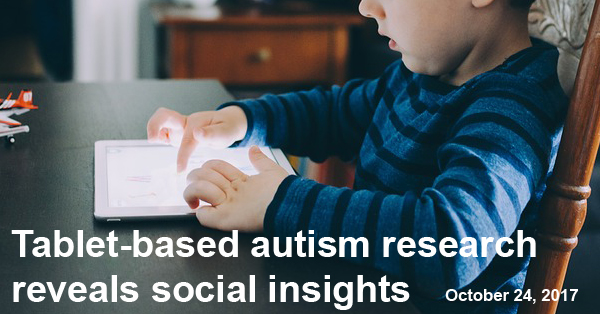Check out other stories from the Latest News
Tablet-Based Autism Research Reveals Social Insights
By Shana R. Spindler, PhD on October 24, 2017

Background: Babies are drawn to sights and sounds of the social world. A mother’s voice, a friendly face, the sound of laughter—all of these social experiences are important for a baby’s development. In toddlers and children with autism spectrum disorder (ASD), the amount of attention given to social matters is reduced. But to what extent, and at what ages, social interest differs is an active area of study. Newer technologies, such as tablet computers, have opened the door for novel ways to look at social preferences in children with ASD.
What’s new: On June 21, 2017, the journal Scientific Reports published a tablet-based study of children’s desire for social rewards. The researchers enrolled 63 children, ages 14 to 68 months, into the study (25 children with ASD and 38 typically developing children). Each child pressed buttons on a tablet screen that caused social or non-social pictures to appear. As the children played with the tablet, the researchers recorded the children’s social behaviors, such as smiles, vocalizations, and eye contact.
The children with ASD pressed buttons for non-social images at a higher rate than for social images, whereas the typically developing children lacked a preference for social versus non-social. For both groups of children, increased social image selection linked to an increase in social behaviors while playing.
Why it’s important: Many past studies of social interest in children with ASD relied on older children and passive viewing of images. This unique, tablet-based approach allowed researchers to test social reward-seeking in a younger group of children. The results are consistent with earlier findings that children with ASD favor non-social stimuli.
Help me understand :
| Source(s) : |
| Tweet |

